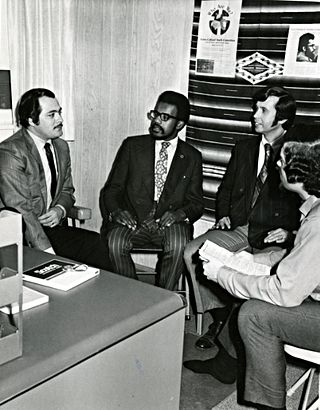Related Research Articles

Literary theory is the systematic study of the nature of literature and of the methods for literary analysis. Since the 19th century, literary scholarship includes literary theory and considerations of intellectual history, moral philosophy, social philosophy, and interdisciplinary themes relevant to how people interpret meaning. In the humanities in modern academia, the latter style of literary scholarship is an offshoot of post-structuralism. Consequently, the word theory became an umbrella term for scholarly approaches to reading texts, some of which are informed by strands of semiotics, cultural studies, philosophy of language, and continental philosophy.

Dialogue is a written or spoken conversational exchange between two or more people, and a literary and theatrical form that depicts such an exchange. As a philosophical or didactic device, it is chiefly associated in the West with the Socratic dialogue as developed by Plato, but antecedents are also found in other traditions including Indian literature.
The genre of Menippean satire is a form of satire, usually in prose, that is characterized by attacking mental attitudes rather than specific individuals or entities. It has been broadly described as a mixture of allegory, picaresque narrative, and satirical commentary. Other features found in Menippean satire are different forms of parody and mythological burlesque, a critique of the myths inherited from traditional culture, a rhapsodic nature, a fragmented narrative, the combination of many different targets, and the rapid moving between styles and points of view.

Mikhail Mikhailovich Bakhtin was a Russian philosopher, literary critic and scholar who worked on literary theory, ethics, and the philosophy of language. His writings, on a variety of subjects, inspired scholars working in a number of different traditions and in disciplines as diverse as literary criticism, history, philosophy, sociology, anthropology and psychology. Although Bakhtin was active in the debates on aesthetics and literature that took place in the Soviet Union in the 1920s, his distinctive position did not become well known until he was rediscovered by Russian scholars in the 1960s.
Heteroglossia is the coexistence of distinct linguistic varieties, styles of discourse, or points of view within a single language. The term translates the Russian разноречие [raznorechie: literally, "varied-speechedness"], which was introduced by the Russian literary theorist Mikhail Bakhtin in his 1934 paper Слово в романе [Slovo v romane], published in English as "Discourse in the Novel." The essay was published in English in the book The Dialogic Imagination: Four Essays by M.M. Bakhtin, translated and edited by Michael Holquist and Caryl Emerson.

Notes from Underground is a novella by Fyodor Dostoevsky first published in the journal Epoch in 1864. It is a first-person narrative in the form of a "confession". The work was originally announced by Dostoevsky in Epoch under the title "A Confession".

Genre studies is an academic subject which studies genre theory as a branch of general critical theory in several different fields, including art, literature, linguistics, rhetoric and composition studies.
Carnivalesque is a literary mode that subverts and liberates the assumptions of the dominant style or atmosphere through humor and chaos. It originated as "carnival" in Mikhail Bakhtin's Problems of Dostoevsky's Poetics and was further developed in Rabelais and His World. For Bakhtin, "carnival" is deeply rooted in the human psyche on both the collective and individual level. Though historically complex and varied, it has over time worked out "an entire language of symbolic concretely sensuous forms" which express a unified "carnival sense of the world, permeating all its forms". This language, Bakhtin argues, cannot be adequately verbalized or translated into abstract concepts, but it is amenable to a transposition into an artistic language that resonates with its essential qualities: it can, in other words, be "transposed into the language of literature". Bakhtin calls this transposition the carnivalization of literature. Although he considers a number of literary forms and individual writers, it is François Rabelais, the French Renaissance author of Gargantua and Pantagruel, and the 19th century Russian author Fyodor Dostoevsky, that he considers the primary exemplars of carnivalization in literature.

Valentin Nikolaevich Voloshinov was a Russian Soviet linguist, whose work has been influential in the field of literary theory and Marxist theory of ideology.
The dialogical self is a psychological concept which describes the mind's ability to imagine the different positions of participants in an internal dialogue, in close connection with external dialogue. The "dialogical self" is the central concept in the dialogical self theory (DST), as created and developed by the Dutch psychologist Hubert Hermans since the 1990s.
Relational dialectics is an interpersonal communication theory about close personal ties and relationships that highlights the tensions, struggles and interplay between contrary tendencies. The theory, proposed respectively by Leslie Baxter and Barbara Montgomery in 1988, defines communication patterns between relationship partners as the result of endemic dialectical tensions. Dialectics are described as the tensions an individual feels when experiencing paradoxical desires that we need and/ or want. The theory contains four assumptions, one of them being that relationships are not one dimensional, rather, they consist of highs and lows, without moving in only one direction. The second assumption claims that change is a key element in relational life, in other words, as our lives change, our relationships change with it. Third, is the assumption that, “contradictions or tensions between opposites never go away and never cease to provide tension,” which means, we will always experience the feelings of pressure that come with our contradictory desires. The fourth assumption is that communication is essential when it comes to working through these opposing feelings. Relationships are made in dialogue and they can be complicated and dialogue with similarities and differences are necessary. Relational communication theories allow for opposing views or forces to come together in a reasonable way. When making decisions, desires and viewpoints that often contradict one another are mentioned and lead to dialectical tensions. Leslie A. Baxter and Barbara M. Montgomery exemplify these contradictory statements that arise from individuals experience dialectal tensions using common proverbs such as "opposites attract", but "birds of a feather flock together"; as well as, "two's company; three's a crowd" but "the more the merrier". This does not mean these opposing tensions are fundamentally troublesome for the relationship; on the contrary, they simply bring forward a discussion of the connection between two parties.
In literature, polyphony is a feature of narrative, which includes a diversity of simultaneous points of view and voices. Caryl Emerson describes it as "a decentered authorial stance that grants validity to all voices." The concept was introduced by Mikhail Bakhtin, using a metaphor based on the musical term polyphony.

Egalitarian dialogue is a dialogue in which contributions are considered according to the validity of their reasoning, instead of according to the status or position of power of those who make them. Although previously used widely in the social sciences and in reference to the Bakhtinian philosophy of dialogue, it was first systematically applied to dialogical education by Ramón Flecha in his 2000 work Sharing Words. Theory and Practice of Dialogic Learning.

Dialogic learning is learning that takes place through dialogue. It is typically the result of egalitarian dialogue; in other words, the consequence of a dialogue in which different people provide arguments based on validity claims and not on power claims.

Interpersonal communication is an exchange of information between two or more people. It is also an area of research that seeks to understand how humans use verbal and nonverbal cues to accomplish several personal and relational goals. Communication includes utilizing communication skills within one's surroundings, including physical and psychological spaces. It is essential to see the visual/nonverbal and verbal cues regarding the physical spaces. In the psychological spaces, self-awareness and awareness of the emotions, cultures, and things that are not seen are also significant when communicating.

Fred Reinhard Dallmayr is an American philosopher and political theorist. He is Packey J. Dee Professor Emeritus in Political Science with a joint appointment in philosophy at the University of Notre Dame (US). He holds a Doctor of Law from the Ludwig Maximilian University of Munich, and a PhD in political science from Duke University. He is the author of some 40 books and the editor of 20 other books. He has served as president of the Society for Asian and Comparative Philosophy (SACP); an advisory member of the scientific committee of RESET – Dialogue on Civilizations (Rome); the executive co-chair of World Public Forum – Dialogue of Civilizations (Vienna), and a member of the supervisory board of the Dialogue of Civilizations Research Institute (Berlin).
Problems of Dostoevsky's Poetics is a book by the 20th century Russian philosopher and literary theorist Mikhail Bakhtin. It was originally published in 1929 in Leningrad under the title Problems of Dostoevsky's Creative Art but was re-published with significant additions under the new title in 1963 in Moscow. The book was first translated into English in 1973 by R. William Rotsel but this version is now out of print. Caryl Emerson's 1984 translation is the version now used for academic discussion in English.
The twentieth century Russian philosopher and literary theorist Mikhail Bakhtin wrote extensively on the concept of dialogue. Although Bakhtin's work took many different directions over the course of his life, dialogue always remained the "master key" to understanding his worldview. Bakhtin described the open-ended dialogue as "the single adequate form for verbally expressing authentic human life". In it "a person participates wholly and throughout his whole life: with his eyes, lips, hands, soul, spirit, with his whole body and deeds. He invests his entire self in discourse, and this discourse enters into the dialogic fabric of human life, into the world symposium."
Caryl Emerson is an American literary critic, slavist and translator. She is best known for her books and scholarly commentaries on the Russian philosopher and literary theorist Mikhail Bakhtin. She has translated some of Bakhtin's most influential works, including Problems of Dostoevsky's Poetics and The Dialogic Imagination: Four Essays by M.M. Bakhtin. Emerson was Professor of Slavic Languages and Literatures and of Comparative Literature at Princeton University from 1988 until her retirement in 2015. From 1980 to 1987 she was a professor of Russian Literature at Cornell.
The Dialogic Imagination is a book on the nature and development of novelistic prose, comprising four essays by the twentieth century Russian philosopher and literary theorist Mikhail Bakhtin. It was edited and translated into English by Michael Holquist and Caryl Emerson, who gave the work its English title.
References
- Beck Hamilton, HH (1998). "'Speak That I May See You!' The Dialogic Element in Hippel's Lebensläufe". In Kohnen, Joseph (ed.). Königsberg-Studien. Beiträge zu einem besonderen Kapitel der deutschen Geistesgeschichte des 18. und angehenden 19. Jahrhunderts. Frankfurt: Peter Lang. pp. 123–135. ISBN 9783631326770.
- Eliot, T.S. (1922). "Tradition and the Individual Talent". The Sacred Wood: Essays on Poetry and Criticism . Retrieved August 21, 2006.
- Gillespie, A. (2006). "Descartes' demon: A dialogical analysis of 'Meditations on First Philosophy" (PDF). Theory & Psychology. 16 (6): 761–781. doi:10.1177/0959354306070527. hdl: 1893/705 . S2CID 144046196. Archived from the original (PDF) on 2009-05-09.
- Hatch, M.J.; Cunliffe, A.L. (2006). Organizational theory (2nd ed.). New York: Oxford University Press. pp. 205–206. ISBN 9780199260218.
- Marková, I. (2003). Dialogicality and social representations: The dynamics of mind. Cambridge: Cambridge University Press. ISBN 9780521824859.
- Hermans, H.J.M.; Hermans-Konopka, A., eds. (2010). Dialogical self theory. Positioning and Counter-Positioning in a Globalizing Society. Cambridge University Press. ISBN 978-0-521-76526-8.